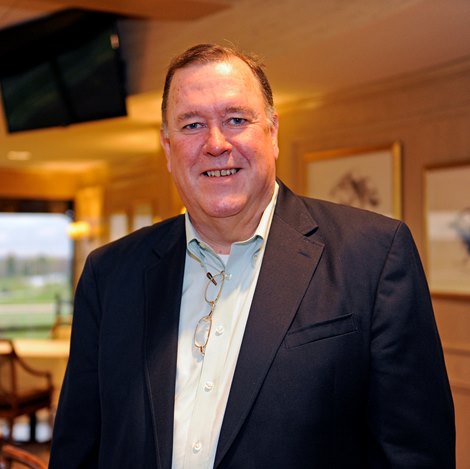ARCI Conference: Numerous Topics Explored on Day 2

By his own admission, Tim Livingston doesn’t know much about horse racing. But his appearance on the second day of the Association of Racing Commissioners International’s 88th Annual Conference on Safe Horses and Honest Sport had the room full of horse-racing regulators and other industry participants spellbound.
Livingston is an investigative sports journalist and host of the true-crime podcast whistleblowerpod.com (coming soon to Netflix and FX). His life’s work was charted when he spent a decade investigating the NBA’s 2007 gaming scandal involving referee Tim Donaghy, organized crime and more. The Atlanta-based Livingston was the featured speaker for the ARCI conference session entitled “Behind the Curtain of Other Sports—What the Public May Never Get to See.”
Besides being interesting and at times jaw-dropping, the topic was of keen interest to the regulators because of the burgeoning of sports betting, now legal in 33 states. Ed Martin, the ARCI president and CEO, said no other professional sport undergoes horse racing’s regulation and government oversight. While sports wagering is regulated by the states, they don’t regulate the betting product—unlike betting on horses.
The ARCI is the umbrella organization of the official rule-making bodies for professional horse and greyhound racing.
“With the way the world is going, I’m super-interested in talking to you guys about what your plans are to make sure these systems are as integrity-driven as possible,” Livingston said via Zoom. “Because right now, I don’t think anybody in the regulations space is really innovating. I think everything is status quo, a quid pro quo system in a lot of these sports.”
Livingston relayed how his deep-dive reporting uncovered what he described as an NBA strategy of using referees to manipulate games to push playoff matchups that would bring the biggest ratings. He stressed the NBA is much better today as far as refs deliberately influencing games, but there remains plenty to keep him in business. For instance, he said data analysis indicates there are nine players in the top 100 in men’s tennis who intentionally will drop the first set but go on to win the match.
“That’s a huge indicator of match-fixing,” he said. “Mafia in Eastern Europe, Italy, South America are going to players who need the money … and say, ‘Hey, you can win the match. Just drop the first set and I’ll give you 50 grand.'” He said tennis hierarchy doesn’t want to rock the boat because it needs the players and might lose those who don’t have sponsors and otherwise couldn’t afford to stay on the various circuits.
Livingston said he has “another year or two of reporting, at least,” but his belief is that the drug testing for performance-enhancing substances in the NFL and NBA are largely a sham.
“Do some simple Google searches on HGH, NFL, doping testing,” he said. “It’s an IQ test; it’s not made to actually catch people. I think you guys have to be careful because a lot of these guys who architect these doping programs are doing so with the leagues…. Their job, in a lot of cases, is to paint a picture of a really thorough doping program than in reality is made to not catch anybody ever.
“… It seems like you guys do a pretty good job, based on my minimal research. Undoubtedly it’s better than the NFL and the NBA.”
Martin said he came across Livingston’s podcast while driving on a trip.
He called it “must listening for anybody who is in this space. I asked Tim, ‘When you did this, did you hear from any sports-betting regulatory authority to say, ‘Hey, this might be something we want to look into?’ Crickets.”
He told Livingston that most of the regulators in the room have no authority over sports wagering. But he pointed out that they are public officials, who must adhere to financial disclosure, conflict of interest, and public records and meetings requirements.
“The drug-testing results are all posted on their websites, how many (equine) athletes have been tested, how many they found adverse findings on, what they found,” Martin said. “They bring a charge on somebody, they’re all public. One of the things that hit me — because I was trying to understand how we compare with, say, the NFL—is that I couldn’t find anything on the NFL.”
Livingston said there was no motivation for transparency in major-league sports in the era before the internet and social media.
“Everything was done behind closed doors, and now those doors are going to be open,” he said. “We’re in 2022. I think by 2030, things are going to look a lot different when it comes to all sports. All this stuff is coming out, one way or another in the next couple of years. So I think the regulatory agency, anybody who embraces this early and wants to get out in front of it and be transparent is going to earn an incredible amount of trust.
“I don’t fully know who you guys are or what you do; I’m still very new to this world. Ed reached out to me, and I think it’s incredibly interesting. That’s why I wanted to talk to you guys. Because I’d love to be on the forefront or help any way possible to increase transparency, better these systems, help with any regulation that’s going to allow for better overall integrity of these sports.”
Livingston concluded by cheerfully telling the regulators, “Anything I can do, let me know. Otherwise I’ll just be in my unfinished basement investigating all these sports scandals.”
Responded Martin: “You have plenty of work ahead of you. I’ll help you understand horse racing. I think there are a lot of people in the room saying, ‘and you think horse racing is bad on any given day!’ We certainly all know what our challenges are, where we can improve. Listening to you doesn’t absolve us of our responsibility, but it’s virgin territory when it comes to human sports.”
Is HISA subject to Federal Open-Records, Open-Meeting law?
The issue of also transparency came up in a panel discussion of potential legal complications that could be triggered by the implementation the Horseracing Integrity and Safety Authority (HISA), which starting July 1 is in charge of national policies involving safety and the welfare of racing participants. (HISA also will have jurisdiction over drug and medication policies, including testing, but has delayed that implementation until 2023, in part because it doesn’t yet have a contract with an independent enforcement agency.)
Nolan Jackson, an attorney with Frost Brown Todd who is among the ARCI’s attorneys, explained how the Federal Advisory Committee Act could apply to HISA’s rule-making process.
“We can think of that law as a federal counterpart to state open-records or open-meetings law,” Jackson said. “The act creates open-records and open-meetings requirements for federal advisory committees. The legal question is HISA a federal advisory committee that would be subject to that law? And if it is, what does that mean? Does HISA have to give advance notice of its meetings? Does it mean HISA has to invite the public into those meetings or make the meetings available to the general public? And what does it mean for federal government officials involvement with HISA.”
Jackson said that HISA appears to be taking the position that the Federal Advisory Committee Act does not apply. “I say that because it’s important to note that HISA has not complied with the Federal Advisory Committee Act, at least up until this point in time,” he said.
He said the act is fairly narrow in scope, only applying to “advisory committees that are established by federal law or established or utilized by the federal government in some way. It only applies to federal advisory committees that exist to provide advice or recommendations to federal government, generally meaning the President of a federal agency of some kind.”
As set forth in its enabling legislation, HISA is a private entity whose regulations for the Thoroughbred racing industry must be approved or rejected by the Federal Trade Commission. The FTC solicits comment from stake-holders about HISA’s proposed rules but does not have the power to use those comments to change or modify them.
Martin said the ARCI, in its submitted comments, encouraged both HISA and the FTC to “require that the issues of transparency, open-records access, public meetings be weaved into their regulatory scheme.
“It’s interesting coming on the heels of what Tim Livingston was telling us about the other sports,” he said, “that transparency is the absolute key to having public confidence in what you’re doing.”
Breed Leaders on Horse Racing in Five Years
Leading executives in the National Thoroughbred Racing Association, the American Quarter Horse Association and the United States Trotting Association were asked their thoughts on horse racing in five years. Some highlights:
Rooney: Moving forward ‘… and it’s not at the expense of one part of our industry for the benefit of another’
Tom Rooney, the former Congressman who recently became NTRA president and CEO, noted that his family-owned regional thoroughbred, harness and greyhound tracks that now are closed, with the exception of Yonkers Raceway, now a racino owned by the MGM conglomerate.
“So I understand where we’ve been in this industry,” said Rooney, whose family most famously owns the Pittsburgh Steelers. “… I am optimistic, but I’m also realistic as to where we could be. I’ve come to learn also that horse racing is a very small town. You know, people talk people behind each other’s back. It doesn’t take long for it to get back to people. There’s animosity, almost like tribalism in our industry. But then there’s also some very good people who are looking out for our future and what’s best for us: How we can get from where we are now to a better place in five years?”
Rooney said he’s spent his first months on the job going around to racetracks and just listening.
“To listen to people like you (the state regulators) and understanding what your concerns are,” he said. “I know there are a lot of very strong opinions in this room. It’s my job to understand what those are, so that together we are moving toward where we are in five years — and it’s not at the expense of one part of our industry for the benefit of another. It’s for all of us to move forward.”
Rooney said he knows from his time in Congress that even if HISA enacts laws that will apply across the country, states can still add more regulations on trainers or racetracks.
“That’s absolutely part of our Constitutional system,” he said. “So the relevance of the racing commissioners, and how you conduct your business state by state is not any less important. What is the law is that there are uniform standards and uniform basic requirements. So that when a horse goes state to state, a trainer knows at the very least that these standards in place in Florida are going to be the same standards in New York or Maryland.”
Rooney concluded saying that horse racing must become part of the expansion of legalized sports wagering.
“My son is a sophomore at Lehigh University,” he said. “He’ll tell me, ‘Dad, people are betting on women’s Chinese basketball at 3 a.m. because they’re allowed to. Or Bulgarian tennis.’ If horse racing isn’t part of that, that’s a huge problem. We can have great days at the Sunland Derby, the Preakness, the Travers or whatever. But we also have to be in the conversation when he’s betting the Sixers or Villanova—’Dad, who’s going to win the Florida Derby today? If I parlay that on my $20 bet, it will boost (the potential payoff) to $1,000.’
“We have to be part of that. If we aren’t, we’re going to miss out on a whole new generation of bettors who are getting involved with FanDuel or Draft Kings or any of the other platforms out there. We have to adapt…. It’s our responsibility together to make sure horse racing is part of the future and not part of what we’ve seen happen too often in this country in the past” with closures.
VanBebber: Keeping Cheaters Out of Entries Proves Good for Business
Janet VanBebber, the former trainer who is the AQHA’s director of racing, said there is a lot of good news to report in Quarter Horse racing. She said that in 2021, a total of 123,727 mares were submitted on stallion breeding reports, a 16-percent increase over the previous year and marking the first time since 2012 that more than 100,000 mares were bred. More than 93,000 American Quarter Horses were registered last year, with those geared for racing seeing “exponential growth,” reflected in part by explosions in those engaging with the AQHA’s racing social-media platforms. Purses and betting have increased the past two years, with sales for Quarter Horse racehorses also up, she said.
VanBebber attributed the growth in part because people “are pretty happy with our measures that we’re doing to protect our sport and to lift up our sport.” She said that includes requiring hair testing as a condition of entering a race.
“That’s really important to our breed, because horsemen were taking advantage of drugs that they could get a performance-enhancing effect out of but that could still pass (the post-race test) in blood and urine,” she said. “If we could keep them from being eligible to enter … then we could level the playing field, which is what we want as horsemen and what the gambler wants as a bettor.”
VanBebber said Oklahoma’s Quarter Horse racing totaled 40 positive drug tests for performance-enhancing drugs in 2017.
“After implementing these past four years condition-of-entry hair testing, they only reported three” last year, she said, adding it was the horsemen’s association urging the measure. “What that tells you is we’re keeping the cheaters from crossing the entry box. Do we still have areas that need improvement? Of course. But the good news is we are actively collaborating toward improvement.
“… Do we have concerns moving forward? Yes. We have concerns about our smaller jurisdictions. Are they going to be able to take on the expense of operating that might be prohibitive?” she said, referencing the additional costs to implement HISA’s structure and regulations for those tracks running both Thoroughbreds and Quarter Horses. “I’m concerned about that. That’s why we’re here at the table, to discuss these things and to see what we can do to make it better.”
VanBebber, raised in California, said it’s not just small tracks that could be affected. “I grew up loving Hollywood Park,” she said. “I just thought Hollywood Park would be there for the rest of my life. So a track as large and successful as Hollywood Park that’s no longer there (closing in 2013)—that’s where the Super Bowl was held this year—it’s reflective to me what can happen to any smaller jurisdiction.”
Tanner: Consolidation of Wealth Hurting Small Barns
Mike Tanner, the USTA executive vice president, echoed the worry of track closures. Hitting the harness world hard is the closing of the iconic Pompano Park, a victim of Florida’s recent legislation that allows racino owners to stay open for casino gaming without having to stage horse racing.
He said consolidation didn’t just apply to racetracks but, as with Thoroughbred racing, more and more horses being controlled by fewer and fewer people.
“Last year there was $439 million in purse money that was distributed,” he said. “Three trainers accounted for 8 percent of those earnings. There were 2,900 trainers who made at least one start last year. Three of them accounted for 8 percent” of total starts.
“… We get calls all the time from smaller trainers saying, ‘I can’t compete with these guys. How do you expect me to stay in the game if I cannot compete?’ That’s a question we don’t have an answer to. The big trainers aren’t doing anything wrong; in fact they’re doing quite well. But there’s a consolidation of wealth in our game amongst a very small percentage that gives them a greater influence as far as horses they get to train. And good horses win races.”
Tanner did have some good news: an ongoing increase of USTA members and mares bred. He said yearly starts-per-horse has remained steady at an average of 18 races for each of the last four years. “Our horses are hearty, they’re durable,” he said.
“If you ask me where are we in five years? I think we’re probably strong at the high end of our sales. I think the horses will continue to improve and get better. I think it’s going to be very appealing to a small segment of society, but I fear that we will have fewer racetracks and I fear we’ll have fewer participants…. We’re going to do all we can to address that and to assure our prosperity going forward.”
Martin: Hoping in 5 years ‘We’re Not fighting With Each Other’
ARCI’s President and CEO Ed Martin batted cleanup to the luncheon panel. He said that in five years, “I’d like to see a sport where we’re not fighting with each other over things, policies,” emphasizing there’s so much wonderful about horse racing.
Martin noted that the HISA legislation was attached to a “must pass” bill, in this case the $1.5 trillion COVID relief omnibus bill approved by Congress in December 2020. Drawing on his 10 years as a senior aide on Capitol Hill earlier in his career, Martin said such must-pass bills are known as Christmas trees. “And we’d try to hang a Christmas ornament on it,” he said.
“It was part of a must-pass piece of legislation that most members probably didn’t digest the details,” Martin said in follow-up comments. “But what troubled me most was that it was attached to a $1.5 trillion spending bill where the federal government was literally throwing money out the window at all sorts of things, and the sponsors of the bill didn’t provide one penny for horse racing (to implement the federally mandated HISA). If they had provided funding, say $50 million, it would have really helped the sport, would have helped HISA. But Senator (Mitch) McConnell didn’t give it a dime.”
He noted at the panel that the federal government gives the U.S. Anti-Doping Agency $9 million a year “to do like 13,000 drug tests. What are we doing? Over 200,000 drug tests?” he said.
Industry News Releases – In support of Thoroughbred industry organizations, BloodHorse is posting news releases relating to the industry. The releases have not been edited by BloodHorse. If there are any questions please contact the organization that has produced the news release as directed in the news release.




